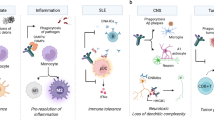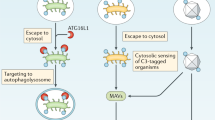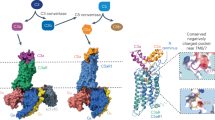Abstract
A classical function of C1q is to bind immune complexes and initiate complement activation producing membrane lytic complexes, opsonins and anaphylatoxins. This classical pathway of complement activation is also elicited when C1q binds some other ligands. Besides complement activation, C1q also regulates cell differentiation, adhesion, migration, activation and survival. C1q deficiency is associated with autoimmunity as well as increased susceptibility to infections. In this article, we discuss the basic properties of C1q, its expression, and classical and regulatory functions.
This is a preview of subscription content, access via your institution
Access options
Subscribe to this journal
Receive 12 digital issues and online access to articles
$119.00 per year
only $9.92 per issue
Buy this article
- Purchase on Springer Link
- Instant access to full article PDF
Prices may be subject to local taxes which are calculated during checkout
Similar content being viewed by others
Author information
Authors and Affiliations
Corresponding author
Rights and permissions
About this article
Cite this article
Lu, J., Teh, B., Wang, L. et al. The Classical and Regulatory Functions of C1q in Immunity and Autoimmunity. Cell Mol Immunol 5, 9–21 (2008). https://doi.org/10.1038/cmi.2008.2
Received:
Accepted:
Issue Date:
DOI: https://doi.org/10.1038/cmi.2008.2
Keywords
This article is cited by
-
Sex-dependent differences in the genomic profile of lingual sensory neurons in naïve and tongue-tumor bearing mice
Scientific Reports (2023)
-
Identification of biomarkers of chronic kidney disease among kidney-derived proteins
Clinical Proteomics (2022)
-
1,25-dihydroxyvitamin D3 ameliorates lupus nephritis through inhibiting the NF-κB and MAPK signalling pathways in MRL/lpr mice
BMC Nephrology (2022)
-
Understanding the contextual functions of C1q and LAIR-1 and their applications
Experimental & Molecular Medicine (2022)
-
Multiplexed mRNA analysis of brain-derived extracellular vesicles upon experimental stroke in mice reveals increased mRNA content with potential relevance to inflammation and recovery processes
Cellular and Molecular Life Sciences (2022)



